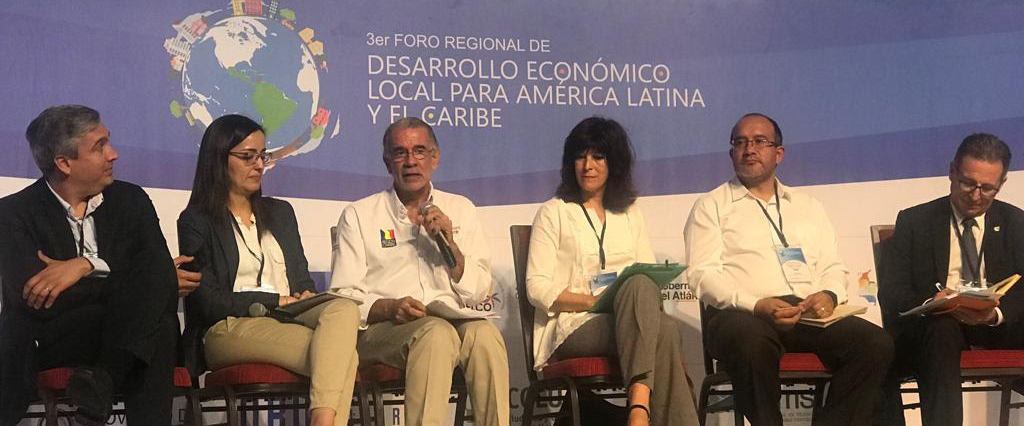The Colombian juncture permeates the III LED Forum for Latin America

The III Local Economic Development Forum for Latin America and the Caribbean, held in Barranquilla from 7 to 9 May, was completely determined by the political and social situation in Colombia. The Forum, entitled "Local Economic Development in Fragile and Conflict-Affected Territories", was attended by local and regional governments from all over Latin America, a large representation of ORU Fogar members, but also a large representation of Colombian political and social actors.
Colombian news made its way into the Forum when, coinciding with the inauguration of the event, the Colombian Senate approved the much-claimed Law of Regions. The host of the Forum, the governor of the Atlantic Department, Eduardo Verano, the main promoter of the Law, explained the long political struggle that, since the approval of the 1991 Constitution - which allowed the regions - has been carried out to overcome the resistance of centralism. "From 2022 we will be able to have Territorial Entities Regions with popular election, with resources and competences". For the governor, Colombia has lived 208 years of centralism and, even today, 85 percent of the Republic's resources are administered by the State. I hope," he said, "that the time when governors had to go to Bogotá with knee pads and a hat, knee pads for kneeling and a hat for begging has come to an end".
Eduardo Verano explained to the plenary of the Forum the scope of the new legislative framework, in a task that was accompanied by the manager of the Administrative Region and Pacific Planning, Camillo Lloreda. In a table introduced and moderated by Ana Tapia of the Diputación de Barcelona, and as a counterpoint to the Colombian decentralized process, singular processes were seen as the Chilean, the Ecuadorian and the Uruguayan. Fernando Verdugo, Chancellor of Ancore, presented Chile as the Latin American 'ugly duckling' of decentralization. The prefect of Carchi, Guillermo Herrera, presented the Ecuadorian case and affirmed that his experience allowed him to affirm that "the greater the decentralization, the greater the equity". Ioanna Grotiuz explained the Uruguayan challenge of decentralizing by creating municipalities articulated with the intermediate government of the intendencies.
Despite speaking of post-conflict, Colombian civil society present at the Forum made it clear that Colombia is still in conflict. As explained by Manel Vila, Director General of Cooperation of Catalonia, with a long history of work in Colombia, the nearly 500 social leaders killed and the 15,000 active guerrilla fighters do not allow us to speak of Post-conflict, but of conflict in an attenuated phase. Silvia Ruiz of the Commonwealth of the Andes explained how local development projects were approached in the Peruvian regions affected by the Shining Path violence. From this same country, the governor of Libertad, Manuel Llenpen, spoke of the social imbalances between the coast and the Andean zone of his region and of his efforts to close the inequality gaps, as the best way to avoid conflicts. Jorge Guamán, prefect of Cotopaxi, called attention to environmental problems as the genesis of potential future problems.
At the closing, Carlos Calleja, director of ADELCO, organizer of the event, read a summary of the "Manifesto of Barranquilla" which stated that "the situation of economic growth is not guaranteeing the well-being of the majority of the population of Latin America". The text pointed out inequality as a risk and a breeding ground for potential conflicts, while at the same time calling for a struggle for social and territorial cohesion and a dialogue with the territories to undertake the resolution of problems.








































































